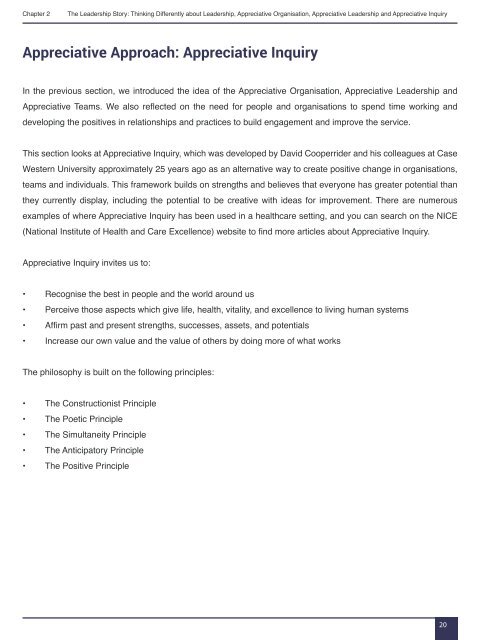Appreciative-Leadership
Appreciative-Leadership
Appreciative-Leadership
You also want an ePaper? Increase the reach of your titles
YUMPU automatically turns print PDFs into web optimized ePapers that Google loves.
Chapter 2<br />
The <strong>Leadership</strong> Story: Thinking Differently about <strong>Leadership</strong>, <strong>Appreciative</strong> Organisation, <strong>Appreciative</strong> <strong>Leadership</strong> and <strong>Appreciative</strong> Inquiry<br />
<strong>Appreciative</strong> Approach: <strong>Appreciative</strong> Inquiry<br />
In the previous section, we introduced the idea of the <strong>Appreciative</strong> Organisation, <strong>Appreciative</strong> <strong>Leadership</strong> and<br />
<strong>Appreciative</strong> Teams. We also reflected on the need for people and organisations to spend time working and<br />
developing the positives in relationships and practices to build engagement and improve the service.<br />
This section looks at <strong>Appreciative</strong> Inquiry, which was developed by David Cooperrider and his colleagues at Case<br />
Western University approximately 25 years ago as an alternative way to create positive change in organisations,<br />
teams and individuals. This framework builds on strengths and believes that everyone has greater potential than<br />
they currently display, including the potential to be creative with ideas for improvement. There are numerous<br />
examples of where <strong>Appreciative</strong> Inquiry has been used in a healthcare setting, and you can search on the NICE<br />
(National Institute of Health and Care Excellence) website to find more articles about <strong>Appreciative</strong> Inquiry.<br />
<strong>Appreciative</strong> Inquiry invites us to:<br />
• Recognise the best in people and the world around us<br />
• Perceive those aspects which give life, health, vitality, and excellence to living human systems<br />
• Affirm past and present strengths, successes, assets, and potentials<br />
• Increase our own value and the value of others by doing more of what works<br />
The philosophy is built on the following principles:<br />
• The Constructionist Principle<br />
• The Poetic Principle<br />
• The Simultaneity Principle<br />
• The Anticipatory Principle<br />
• The Positive Principle<br />
20


